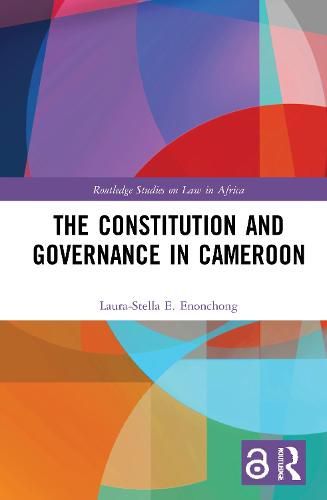Readings Newsletter
Become a Readings Member to make your shopping experience even easier.
Sign in or sign up for free!
You’re not far away from qualifying for FREE standard shipping within Australia
You’ve qualified for FREE standard shipping within Australia
The cart is loading…






This book provides a systematic analysis of the major structural and institutional governance mechanisms in Cameroon, critically analysing the constitutional and legislative texts on Cameroon’s semi-presidential system, the electoral system, the legislature, the judiciary, the Constitutional Council and the National Commission on Human Rights and Freedoms.
The author offers an assessment of the practical application of the laws regulating constitutional institutions and how they impact on governance. To lay the groundwork for the analysis, the book examines the historical, constitutional and political context of governance in Cameroon, from independence and reunification in 1960-1961, through the adoption of the 1996 Constitution, to more recent events including the current Anglophone crisis. Offering novel insights on new institutions such as the Senate and the Constitutional Council and their contribution to the democratic advancement of Cameroon, the book also provides the first critical assessment of the legislative provisions carving out a special autonomy status for the two Anglophone regions of Cameroon and considers how far these provisions go to resolve the Anglophone Problem.
This book will be of interest to scholars of public law, legal history and African politics.
The Open Access version of this book, available at https://www.taylorfrancis.com/books/9781351028868, has been made available under a Creative Commons Attribution-Non Commercial-No Derivatives 4.0 license
$9.00 standard shipping within Australia
FREE standard shipping within Australia for orders over $100.00
Express & International shipping calculated at checkout
This book provides a systematic analysis of the major structural and institutional governance mechanisms in Cameroon, critically analysing the constitutional and legislative texts on Cameroon’s semi-presidential system, the electoral system, the legislature, the judiciary, the Constitutional Council and the National Commission on Human Rights and Freedoms.
The author offers an assessment of the practical application of the laws regulating constitutional institutions and how they impact on governance. To lay the groundwork for the analysis, the book examines the historical, constitutional and political context of governance in Cameroon, from independence and reunification in 1960-1961, through the adoption of the 1996 Constitution, to more recent events including the current Anglophone crisis. Offering novel insights on new institutions such as the Senate and the Constitutional Council and their contribution to the democratic advancement of Cameroon, the book also provides the first critical assessment of the legislative provisions carving out a special autonomy status for the two Anglophone regions of Cameroon and considers how far these provisions go to resolve the Anglophone Problem.
This book will be of interest to scholars of public law, legal history and African politics.
The Open Access version of this book, available at https://www.taylorfrancis.com/books/9781351028868, has been made available under a Creative Commons Attribution-Non Commercial-No Derivatives 4.0 license